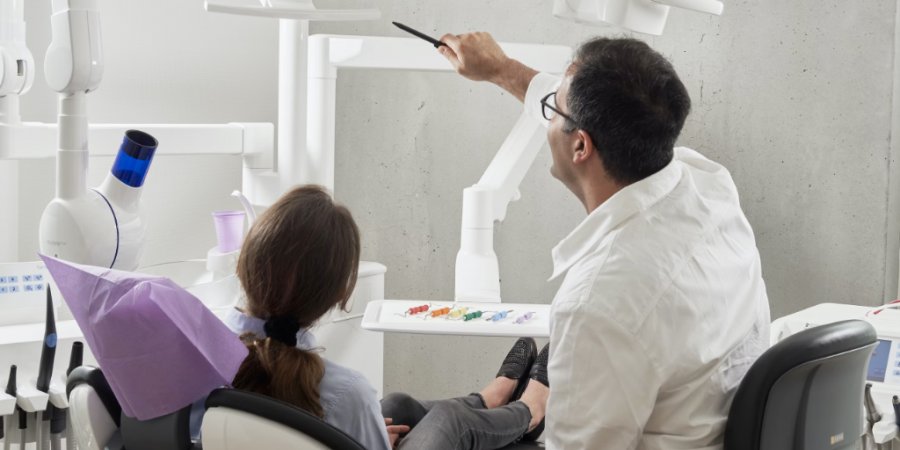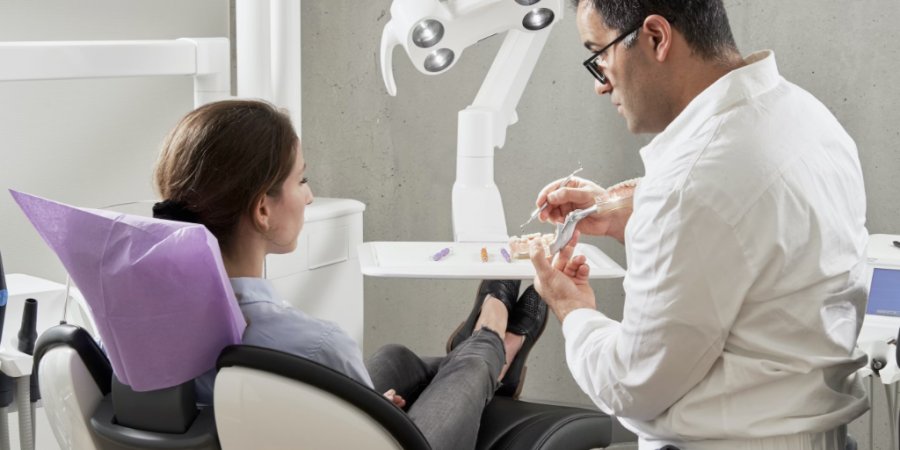Pros and Cons of Biological Dentistry

Biological dentistry, commonly known as holistic dentistry, seeks to understand a patient’s way of life, diet, and general health rather than just dealing with teeth problems. A holistic dentist will be interested in your dental and overall health. Additionally, the holistic approach aims at undertaking measures to prevent rather than treat dental issues. Hence, it’s a comprehensive approach to dentistry and is set to expand in the coming years as more and more people appreciate its significance.
What Is a Holistic Dentist?

A holistic dentist goes beyond just treating teeth and gums to look at the connection between oral health and the entire body. They promote total health and wellness rather than just fixing isolated issues in the mouth.
A holistic dentist may use both conventional and alternative treatments. They aim to treat the root cause of oral health problems rather than just the symptoms. Some key aspects of holistic dentistry include:
- Seeing the Mouth-Body Connection - Holistic dentists understand that the health of the mouth impacts the rest of the body and vice versa. Problems like gum disease have been linked to heart disease, diabetes, stroke, and premature birth.
- Non-Toxic Materials - Holistic dentists avoid placing mercury fillings, nickel crowns, and other potentially toxic materials in the mouth. They use biocompatible materials that will not harm the body.
- Nutritional Counseling - Diet and nutrition are evaluated as part of the patient's overall health. A holistic dentist may provide guidance on dietary changes to support oral and systemic health.
- Preventive Care - Holistic dentists place emphasis on prevention of disease through regular cleanings, sealants, and early detection. Their goal is to treat the cause of disease before major damage occurs.
- Alternative Therapies - Holistic dentists may incorporate alternative treatments like acupuncture, homeopathy, herbal remedies, or Ayurvedic medicine to complement typical dental treatments.
- Whole Body Focus - Rather than just treating the teeth, holistic dentists look at the connection to health of the entire mind and body. They look to address the root causes of disease that contribute to dental problems.
In summary, holistic dentists provide an integrative approach to dentistry. They promote education and preventive care to achieve optimal oral health as part of total body wellness.
Pros of Biological Dentistry
1. Use Of Mercury-Free Fillings
Since ancient practices of dentistry, practitioners have been using mercury amalgam. Liquid mercury accounts for half of a dental amalgam while the other half consists of metal particles, mainly copper, tin and silver. Mercury holds the particles together.
Nevertheless, several studies have proved than mercury present in amalgams imposes detrimental health issues on dental patients. The amalgam fillings have been linked to a number of physiological problems. The body absorbs the harmful chemical element and is particularly detrimental to pregnant and breastfeeding women whereby the mercury is absorbed in the placenta and milk. By using mercury-free fillings, biologic dentistry protects you from dangerous health conditions.
2. Safe Removal of Amalgam Fillings
A dentist may expose you to additional mercury during amalgam replacement. The exposure occurs when the dentist scrapes off the amalgam and consequently, makes it easy for your body to absorb extra mercury. Holistic dentistry uses scientifically proven techniques to reduce the risk of exposure to mercury. Moreover, the practitioner will replace the mercury amalgam with safer materials such as composite resin. Accordingly, other than just taking care of your teeth, holistic dentistry looks into the effect of dental practices and materials to your general health.
3. Use of laser devices to eliminate pain during dental drilling
Needles and drills are common triggers of fear in dental patients. Dental patients fear dental drilling owing to the discomfort and pain that come with the procedure. Fortunately, biological dentistry aims at using methods and tools that induce minimal or no pain in patients. Consequently, laser devices have been adopted to drill soft and hard tissues with zero vibrations, heat, and friction. Hence, biological dentistry frees you from anesthesia and pain during dental procedures
4. Preventive Measures
Bacteria buildup on your teeth not only causes periodontal diseases but also exposes you to risk of chronic ailments such as heart disease, stroke, and diabetes. The bacteria may end up causing severe oral problems such as dental cavities and tooth loss. Undoubtedly, such dental issues will affect your smile. Holistic dentistry seeks to prevent the menaces by deep cleaning your teeth to maintain excellent oral health. Through a series of visits, a holistic dentist will thoroughly clean your teeth to eradicate bacteria. This way, the dentistry protects you from dental problems and other health issues.
5. Environmentally safe
The disposal of mercury-based waste material poses a significant threat to the environment. Mercury negatively affects aquatic life and may cause detrimental health issues to people who take mercury-contaminated water. Through the use of mercury-free materials, biological dentistry keeps the environment from mercury pollution.
Cons of Holistic Dentistry
1. It’s expensive
Holistic dentistry involves plenty of approaches to improve not only dental health but also the overall well-being of a person. The practices may, in the long run, prove costly to a considerable number of people. Moreover, some alternatives to mercury amalgam are overly expensive. Lastly, you may find that your dental insurance policy does not cover some holistic dentistry procedures.
2. Unavailability
Biological dentistry has not been widely accepted in the health sector and marred by critics who try to downgrade the approach. The hindrances limit the expansion of the strategy and adoption by dental health practitioners. Consequently, few dental patients can access the services. Moreover, the expensive nature of dentistry may be preventing many patients from seeking
Is Holistic Dentistry More Expensive?
Holistic dentistry takes a more comprehensive and preventive approach that requires additional time, expanded treatment options, and specialized materials. This often translates to higher costs for the patient. However, holistic dentistry aims to prevent larger problems down the road.
Some specific reasons holistic dentistry may have higher costs include:
- Lengthier Appointments - Holistic dentists spend more time with each patient in order to do a thorough exam, explain all treatment options, and get to the root causes of oral health issues. This additional time gets passed along as higher fees.
- Use of Biocompatible Materials - The non-toxic filling materials often used by holistic dentists tend to be more expensive than conventional amalgam fillings or metals. However, the improved compatibility may lead to better long-term oral health.
- Additional Preventive Services - Rather than just drilling and filling teeth, holistic dentists emphasize preventive care through regular cleanings, sealants, nutritional counseling, and supplements. These services cost extra but lead to savings from avoided large treatments.
- Alternative Therapies - Holistic dentists may recommend acupuncture, massage therapy, craniosacral therapy, or other alternative treatments in addition to standard dental care. Most insurance plans do not cover these.
- No Amalgam Filling Replacement - Because they avoid amalgam fillings with mercury, holistic dentists often recommend replacement with composite fillings. This leads to additional costs for the patient.
While holistic dentistry has higher fees associated with it, many patients feel the investment in their long-term health is worthwhile. Some dental insurance plans may provide limited coverage for services from a holistic dentist as well.
Conclusion
Biological dentistry seeks to redefine dentistry by introducing new practices that look into the overall health of a patient. Therefore, biological dentistry considers your lifestyle as well as your diet. The field is marked by the use of mercury-free dental materials, safe removal of mercury amalgams, and maintenance practices to enhance your oral and general health. However, biological dentistry is relatively expensive when compared to regular dentistry.
More to Read:
Previous Posts:





